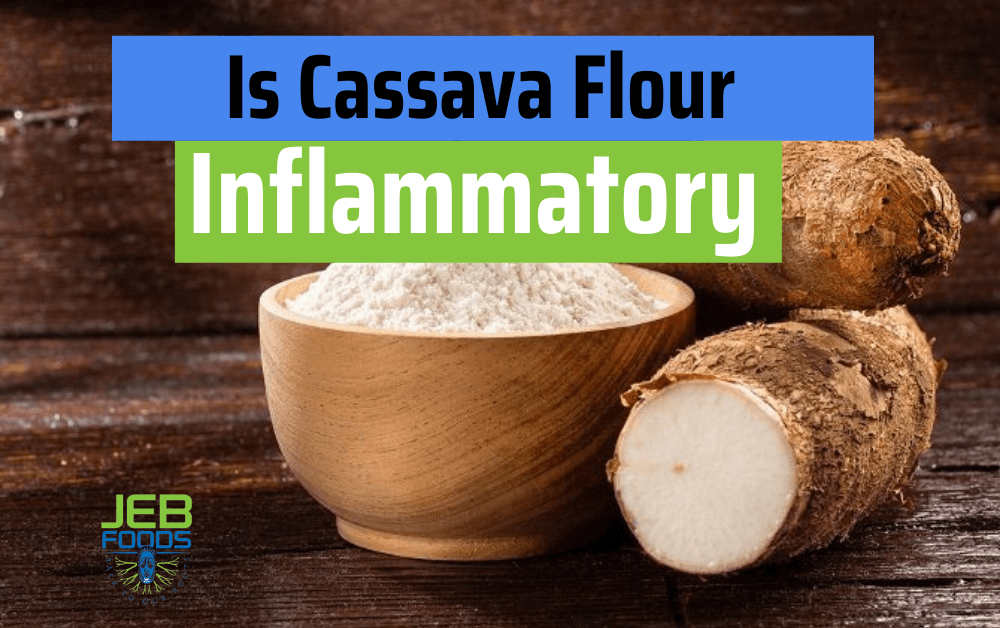To answer the question “is cassava flour Inflammatory” directly. No, it is Not.
Cassava flour is an Anti-Inflammatory Flour’s, and it contains a high resistant starch content, one of its many health benefits. This nourishes the good bacteria in the digestive system.
I went deeper in explaining all about the resistant starch of cassava flour here
It has the potential to alleviate inflammation while also benefiting the digestive system. Irritable Bowel Syndrome (IBS) and Irritable Bowel Disorder patients should use cassava flour (IBD).
Inflammation is the natural body’s response through which the white blood cells protect the body against external aggression. It could either be acute or chronic and can also be triggered by several things, including the food you eat.
Cassava flour is becoming more known among bakers, as an alternative to wheat flour due to its gluten-free status and high fiber and resistant starch content, which aids in digestion and helps reduce inflammation.
See all the health and nutritional benefits of cassava flour
What is inflammation
Table of Contents
ToggleTo determine if Cassava Flour is Inflammatory, we must first know the meaning of inflammation.
Inflammation, in its broadest sense, is the immune system’s response to a stimulus.
It can occur due to common injuries such as burning your finger or falling off a bicycle, which causes the affected area to become red, warm, and puffy.
It is a localized injury response characterized by ‘increased blood flow, capillary dilation, leukocyte infiltration, and chemical mediator production.’
In a nutshell, an inflammatory response indicates that the innate (non-specific) immune system is ‘fighting something that may turn out to be harmful.’
Inflammation occurs when you have influenza and have a fever. Inflammation occurs when you eat something wrong and get diarrhea. Is your ankle swollen after you twisted it? That, too, is inflammation.
Check if gluten free flours help against diabetes
Types of Inflammation
Inflammation is classified into two types. Short-term (acute) or long-term (chronic) inflammation (chronic).
Now, depending on the severity, acute inflammation can last from a few hours to many days. After the initial stimulus has gone, chronic inflammation may persist for months or even years.
Acute Inflammation
This is usually caused by an injury, such as a sprained ankle, or an illness, such as bacterial infections or common viruses.
The acute inflammatory process is rapid and can be severe. You’ve probably seen inflammation in action if you’ve ever broken a bone or cut yourself.
Common signs of inflammation include:
- Redness
- Tenderness and pain
- Swollenness, bumps, or puffiness
- Warmth at the site of the injury
- Bruising
- Stiffness
- Impaired mobility
Acute inflammation can be limited to a specific part of the body or systemic, as in the case of a viral infection. When your body detects a potentially harmful invader, such as a bacteria or virus, it launches a full-body immune response to combat it.
Several inflammatory chemicals are released by white blood cells. This type of acute inflammation makes you feel sick and exhausted because your body expends all of its energy fighting infection.
Among the symptoms of this type of inflammation are:
- Fever
- Nausea
- Lethargy
- Sleepiness
- Irritability
- A runny nose
- Throat discomfort
- Congested nose
- Headache
Signs and symptoms may persist for a few days or weeks, or even longer in more severe cases.
Chronic inflammation
Chronic, long-term inflammation can last years, if not a lifetime. It frequently begins in the absence of an injury or illness, and it lasts far longer than it should.
Chronic inflammation is unknown to scientists because it does not appear to serve a purpose like acute inflammation. However, they do know that it can cause significant changes to the body’s tissues, organs, and cells over time.
It’s important to remember that there’s a big difference between two things being associated and one thing causing another.
Chronic inflammation is one of several factors that contribute to disease onset and progression. So far, type 2 diabetes and heart disease have been found to have the most robust links between chronic inflammation and disease.
Chronic inflammation is also linked to the following conditions:
- Hypertension (high blood pressure)
- Hypercholesterolemia
- Kidney failure
- Cancers of various types
- Depression
- Neurodegenerative diseases (such as Alzheimer’s disease)
- Autoimmune diseases
- Osteoporosis
- Fatty liver syndrome
Chronic inflammation frequently progresses quietly, with few distinct symptoms. Despite its subtlety, chronic inflammation poses a significant threat to the health and longevity of a large population of people.
Causes of Inflammation
Inflammation occurs when a physical factor sets off an immune response. Inflammation does not always indicate infection, but infection can cause inflammation.
Acute inflammation: what causes it
• being exposed to a substance, such as a bee sting or dust, or being injured.
• a sickness
When the immune system detects damage or pathogens, it responds in several ways:
• Tissues accumulate plasma proteins, resulting in fluid buildup and swelling.
• Leukocyte or White blood cells known as neutrophils are sent to the affected area by the body. Molecules found in leukocytes can help in the fight against pathogens.
• Enlargement of small blood vessels to facilitate the delivery of leukocytes and plasma proteins to the injury site.
Depending on the cause, symptoms of acute inflammation can appear within hours or days. They can quickly become severe in some cases.
The cause, the area of the body affected, and individual characteristics all determine how they develop and how long they last.
Acute bronchitis, appendicitis, and other disorders with the suffix “-itis” are instances of risk factors.
Here is how to use cassava flour instead of wheat flour in your baking
Chronic Inflammation: What Causes It
The causes, symptoms, and purposes of acute and chronic inflammation are distinct.
Causes of Chronic inflammation could include the following:
- Physical inactivity: When you move your muscles, the anti-inflammatory chemical process occurs in your bloodstream. People who do not meet the minimum activity recommendations for optimal health (roughly half of all American adults) are at a higher risk of developing age-related diseases.
- Obesity: Fat tissue, particularly visceral fat (a deep layer of fat surrounding the abdominal organs), produces pro-inflammatory chemicals.
- Diet: High-fat, trans-fat, and refined sugar diets have increased inflammation, particularly in overweight people.
- Cigarette smoking reduces the production of anti-inflammatory molecules and increases inflammation.
- Inflammation is suppressed by sex hormones such as estrogen and testosterone. Lower levels of these hormones, common in old age, raise the risk of inflammatory diseases.
- Stress: Psychological stress has been linked to an increase in inflammation.
- Sleep disorders: People who have irregular sleep schedules have more inflammation markers than those who get a regular eight hours of sleep per night.
- Age: Studies show that chronic inflammation worsens with age.

What Effects Does Chronic Inflammation Have On The Body
Early signs and symptoms of chronic inflammation can be hazy, with subtle signs and symptoms that can go unnoticed for a long time. You might only feel slightly tired or even expected.
However, as inflammation progresses, it begins to harm your arteries, organs, and joints. If left unchecked, it could result in chronic diseases like heart disease, blood vessel disease, diabetes, obesity, cancer, Alzheimer’s disease, and other illnesses.
Inflammatory immune system cells contribute to the accumulation of fatty deposits in the lining of the heart’s arteries. “These plaques can eventually rupture, resulting in the formation of a clot that could potentially block an artery which could result in a heart attack.
A blood test for C-reactive protein (hs-CRP), a marker of inflammation, is the most common way to measure inflammation. Doctors also measure homocysteine levels to assess chronic inflammation. Finally, physicians look for HbA1C — a blood sugar measurement — to see if red blood cells have been damaged.
Inflammation Treatments
Inflammation treatment will be determined by the cause and severity of the inflammation. Often, no treatment is required.
However, not treating inflammation can sometimes result in life-threatening symptoms.
For example, inflammation can cause severe swelling during an allergic reaction, closing the airways and making breathing impossible. If this reaction occurs, it is critical to seek treatment.
Inflammation does not always necessitate medical attention. Rest, ice, and good wound care can often relieve acute inflammation within a few days.
Acute inflammation treatment
A doctor may recommend treatment to eliminate the source of the inflammation, manage symptoms, or both.
Antibiotics or antifungal treatment, for example, maybe prescribed for a bacterial or fungal infection.
Here are some treatments that are specifically designed to treat inflammation:
Nonsteroidal anti-inflammatory medications
Nonsteroidal anti-inflammatory drugs (NSAIDs) do not treat the underlying cause of inflammation, but they can alleviate pain, swelling, fever, and other symptoms. They accomplish this by inhibiting an enzyme that contributes to inflammation.
Naproxen, ibuprofen, and aspirin are examples of NSAIDs. These may be purchased both online and in-store. People should consult with a doctor or pharmacist first to ensure they make the best decision.
People should only use NSAIDs long-term if a doctor recommends it, as they can have adverse side effects. Children should not take aspirin.
Acetaminophen, also known as paracetamol or Tylenol, can relieve pain but does not reduce inflammation. These medications allow the inflammation to continue to play a role in healing.
Corticosteroids
Corticosteroids, like cortisol, are steroid hormones. They affect the various mechanisms involved in inflammation.
Corticosteroids can be used to treat a variety of conditions, including:
- arthritis
- temporomandibular arteritis
- dermatitis
- IBD (inflammatory bowel disease) (IBD)
- systemic lupus erythematosus
- hepatitis
- asthma
- hypersensitivity reactions
They are available as pills, injections, inhalers, creams, and ointments.
Corticosteroids can be harmful if used for an extended period. A doctor can advise you on the risks and benefits of these medications.
Treatment for diseases characterized by long-term inflammation will vary according to the condition.
Some drugs suppress the body’s immune responses. These can help alleviate the symptoms of rheumatoid arthritis, psoriasis, and other autoimmune diseases. They can, however, make a person’s body less capable of fighting an infection if one occurs.
People who have had transplant surgery must also take immunosuppressant medications to keep their bodies from rejecting the new organ. They, too, must take extra precautions to avoid infection.
Supplements for treating inflammation
Specific vitamins (vitamin A, C, D) and supplements (zinc) have reduced inflammation and improved repair.
For instance, your doctor may ask you to take a fish oil supplement or a vitamin (s). Food with anti-inflammatory properties, such as turmeric, ginger, or garlic, can also be used.
Chronic inflammation prevention
Inflammation can be controlled and even reversed with a healthy, anti-inflammatory diet and lifestyle.
People who have a family history of health problems like heart disease or colon cancer should talk to their doctors about making lifestyle changes that help prevent disease by lowering inflammation.
Follow the guidelines below to reduce inflammation in your body:
Eat a lot of anti-inflammatory foods.
Anti-inflammatory foods can protect against inflammation, and your food choices are just as important as the medications and supplements you may be taking for overall health.
“Making good dietary choices that include fresh vegetables and fruits, as well as limiting our intake of refined sugar, can make a big difference.
Limit or eliminate inflammatory foods.
Red meat and anything containing trans fats, such as margarine, corn oil, deep-fried foods, and most processed foods, are examples of inflammatory foods that should be avoided.
Maintain blood sugar levels
Simple carbohydrates should be limited or avoided, such as white flour, white rice, refined sugar, and anything containing high fructose corn syrup.
Avoiding white foods such as white bread, rice, and pasta and foods made with white sugar and flour is a simple rule to follow. Build meals around lean proteins and fiber-rich whole foods like vegetables and fruits.
Schedule time for exercise.
Exercise on a routine basis is also a practical approach to reduce inflammation.
Make time at least four to five times per week for 30 to 45 minutes of aerobic exercise and 10 to 25 minutes of weight or resistance training.
Shed some pounds
Overweight people are more prone to inflammation. Losing weight may help to reduce inflammation.
Deal with stress
Inflammation is exacerbated by chronic stress. Try meditation, yoga, biofeedback, guided imagery, or another technique to manage stress throughout the day.
- Avoid Smoking totally or occasionally.
- You are limiting your alcohol consumption (maximum 2 ounces per day).
- Spending less time seated
- Increased walking
- Getting enough rest
- Avoiding isolation by interacting with others
- Seeing your doctor regularly
Cassava Flour and Stomach Inflammation (Gastritis)
Gastritis is an inflammatory disorder of the stomach lining (the mucosa), resulting in abdominal pain, indigestion (dyspepsia), bloating, and nausea. It has the potential to cause additional issues.
Gastritis can appear suddenly (acute) or gradually (chronic). Medications and dietary changes can help reduce stomach acid and alleviate the symptoms of gastritis.
Cassava flour contains high fiber and resistant starch content, which helps feed the beneficial bacteria in the gut, thereby promoting the health of the digestive system and reducing inflammation.
Resistant starch has also been found to increase metabolic health and reduce the risk of obesity and type 2 diabetes.
Final Thought
Inflammation occurs as a natural response to the system’s defense against harmful agents such as bacteria and viruses, but with you adding cassava flour into your recipes, it will help you against this.
Cassava flour can provide a helpful service in the short term, but it may also reduce discomfort.
On the other hand, long-term or chronic inflammation can both cause and result in some severe and potentially fatal conditions.




